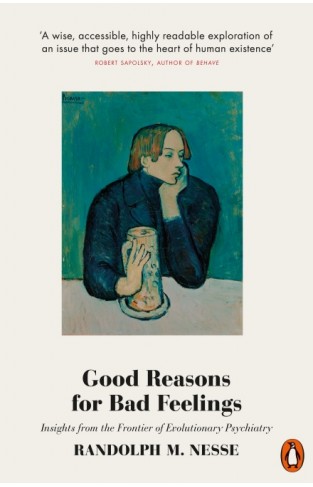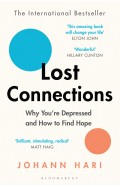Good Reasons for Bad Feelings: Insights from the Frontier of Evolutionary Psychiatry
By: Randolph M Nesse
-
Rs 2,515.50
- Rs 2,795.00
- 10%
You save Rs 279.50.
Due to constant currency fluctuation, prices are subject to change with or without notice.
With his classic book Why We Get Sick, Randolph Nesse established the field of evolutionary medicine. Now he returns with a book that transforms our understanding of mental disorders by exploring a fundamentally new question. Instead of asking why certain people suffer from mental illness, Nesse asks why natural selection has left us with fragile minds at all.Drawing on revealing stories from his own clinical practice and insights from evolutionary biology, Nesse shows how negative emotions are useful in certain situations, yet can become excessive. Anxiety protects us from harm in the face of danger, but false alarms are inevitable. Low mood prevents us from wasting effort in pursuit of unreachable goals, but it often escalates into pathological depression. Other mental disorders, such as addiction and anorexia, result from the mismatch between modern environments and our ancient human past. Taken together, these insights and many more help to explain the pervasiveness of human suffering, and show us new paths for relieving it.Good Reasons for Bad Feelings will fascinate anyone who wonders how our minds can be so powerful, yet so fragile, and how love and goodness came to exist in organisms shaped to maximize Darwinian fitness.
With his classic book Why We Get Sick, Randolph Nesse established the field of evolutionary medicine. Now he returns with a book that transforms our understanding of mental disorders by exploring a fundamentally new question. Instead of asking why certain people suffer from mental illness, Nesse asks why natural selection has left us with fragile minds at all.Drawing on revealing stories from his own clinical practice and insights from evolutionary biology, Nesse shows how negative emotions are useful in certain situations, yet can become excessive. Anxiety protects us from harm in the face of danger, but false alarms are inevitable. Low mood prevents us from wasting effort in pursuit of unreachable goals, but it often escalates into pathological depression. Other mental disorders, such as addiction and anorexia, result from the mismatch between modern environments and our ancient human past. Taken together, these insights and many more help to explain the pervasiveness of human suffering, and show us new paths for relieving it.Good Reasons for Bad Feelings will fascinate anyone who wonders how our minds can be so powerful, yet so fragile, and how love and goodness came to exist in organisms shaped to maximize Darwinian fitness.
Why We Get Sick The New Science Of Darwinian Medicine
By: Randolph M Nesse
Rs 1,185.75 Rs 1,395.00 Ex Tax :Rs 1,185.75
Good Reasons for Bad Feelings: Insights from the Frontier of Evolutionary Psychiatry
By: Randolph M Nesse
Rs 2,515.50 Rs 2,795.00 Ex Tax :Rs 2,515.50
Zubin Mehta: A Musical Journey (An Authorized Biography)
By: VOID - Bakhtiar K. Dadabhoy
Rs 892.50 Rs 1,050.00 Ex Tax :Rs 892.50
Lost Connections: Why You’re Depressed and How to Find Hope
By: Johann Hari
Rs 2,965.50 Rs 3,295.00 Ex Tax :Rs 2,965.50
Thrive: Finding Happiness the Blue Zones Way
By: Dan Buettner
Rs 1,185.75 Rs 1,395.00 Ex Tax :Rs 1,185.75
Lost Connections: Why You’re Depressed and How to Find Hope
By: Johann Hari
Rs 2,965.50 Rs 3,295.00 Ex Tax :Rs 2,965.50
For Esme - with Love and Squalor: And Other Stories
By: J. D. Salinger
Rs 1,355.75 Rs 1,595.00 Ex Tax :Rs 1,355.75
Official Cocomelon: JJ and Friends Box of Books
By: Cocomelon
Rs 2,605.50 Rs 2,895.00 Ex Tax :Rs 2,605.50
Gangster Squad The true story of the Battle for Los Angeles -
By: Paul Lieberman
Rs 675.75 Rs 795.00 Ex Tax :Rs 675.75
Zubin Mehta: A Musical Journey (An Authorized Biography)
By: VOID - Bakhtiar K. Dadabhoy
Rs 892.50 Rs 1,050.00 Ex Tax :Rs 892.50
Why We Get Sick The New Science Of Darwinian Medicine
By: Randolph M Nesse
Rs 1,185.75 Rs 1,395.00 Ex Tax :Rs 1,185.75
Good Reasons for Bad Feelings: Insights from the Frontier of Evolutionary Psychiatry
By: Randolph M Nesse
Rs 2,515.50 Rs 2,795.00 Ex Tax :Rs 2,515.50
Lost Connections: Why You’re Depressed and How to Find Hope
By: Johann Hari
Rs 2,965.50 Rs 3,295.00 Ex Tax :Rs 2,965.50















-120x187.jpg?q6)




















